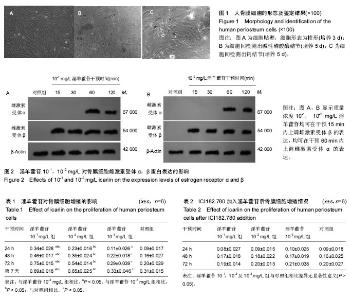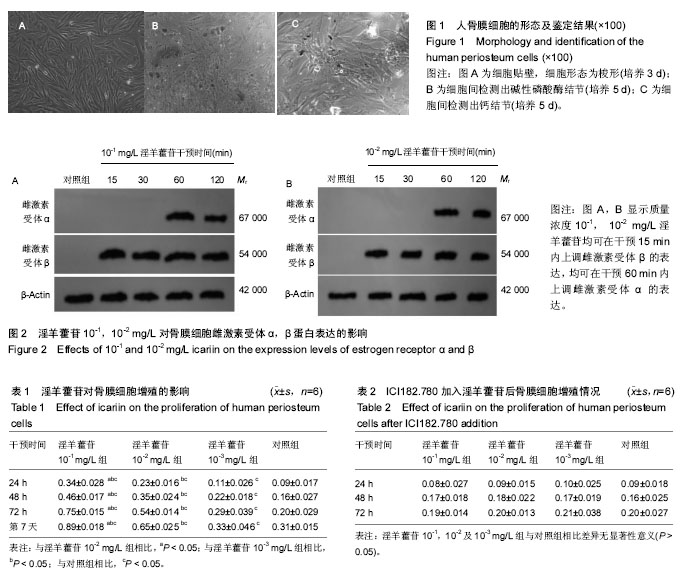| [1] Simonet WS, Lacey DL, Dunstan CR, et al. Osteoprotegerin: a novel secreted protein involved in the regulation of bone density. Cell.1997;89(2):309-319.[2] Kong YY, Yoshida H, Sarosi I, et al. BMP7L is a key regulator of osteoclastogenesis, lymphocyte development and lymph-node organogenesis. Nature. 1999;397(6717): 315-323.[3] Kessler S, Koepp HE, Mayr-Wohlfart U, et al. Bone morphogeneric protein2 accelerates osteointegration and remodelling of sovent-dehydrated bone substitutes. Arch Orthop Trauma Surg. 2004;124(6):410-414.[4] 张超,梁国穗,张颖恺,等.低强度脉冲超声波刺激对人骨髓基质细胞和骨膜细胞生物学效应的影响[J].中华物理医学与康复杂志, 2006,10(5):78-80.[5] 张峻玮,陆海涛,杨宇明,等.低氧培养对骨膜细胞成软骨分化的影响[J].中华实验外科杂志,2016,33(5):1281-1283.[6] 吴涛,徐俊昌,南开辉,等.淫羊藿苷促进羊骨髓间充质干细胞的增殖和成骨分化[J].中国组织工程研究与临床康复, 2009,13(19): 3725-3729.[7] Zhao J, Ohba S, Shinkai M, et al. Icariin induces osteogenic differentiation in vitro in a BMP- and Runx2-dependent manner. Biochem Biophys Res Commun. 2008;369:444-448.[8] 叶丽卡,陈济民.淫羊藿的药理研究进展[J].中国中药杂志,2001, 26(5):293-295.[9] 贾亮亮,袁丁,王洪武,等.淫羊藿苷药理作用的研究进展[J].现代生物医学进展,2010,10(20):3976-3979.[10] 李娌,王学美.淫羊藿苷药理作用研究进展[J].中国中药杂志, 2008,33(28):2727-2732.[11] 关利新,衣欣,杨履艳,等.淫羊藿甙扩血管作用机制的研究[J].中国药理学通报,1996,12(4):320-322.[12] 汪晶晶,唐其柱,王腾,等.淫羊藿苷对兔心室肌细胞L-型钙电流的影响[J].武汉大学学报(医学版),2007,28(3):282-286.[13] 张大威,程岩,张金超,等.淫羊藿苷对破骨细胞的分化及骨吸收功能的影响[J].中国药理学通报,2007,23(4):463-467.[14] Cui J, Zhu M, Zhu S, et al. Inhibitory effect of icariin on Ti-induced inflammatory osteoclastogenesis. J Surg Res. 2014;192:447-453.[15] Hsieh TP, Sheu SY, Sun JS, et al. Icariin inhibits osteoclast differentiation and bone resorption by suppression of MAPKs/NF-kappaB regulated HIF-1alpha and PGE(2) synthesis. Phytomedicine. 2011;18:176-185.[16] Tang D, Ju C, Liu Y, et al. Therapeutic effect of icariin combined with stem cells on postmenopausal osteoporosis in rats. J Bone Miner Metab. 2017.[17] Wei Q, He M, Chen M, et al. Icariin stimulates osteogenic differentiation of rat bone marrow stromal stem cells by increasing TAZ expression. Biomed Pharmacother. 2017;91: 581-589.[18] 陈克明,葛宝丰,马慧萍,等.淫羊藿苷对体外培养骨髓基质干细胞成骨性分化的影响[J].中国骨质疏松杂志, 2008,14(9):645-632.[19] 杨丽,张荣华,朱晓峰,等.淫羊藿苷对大鼠间充质干细胞骨向分化过程中转化生长因子β1、骨形态发生蛋白2表达的影响[J].中国组织工程研究与临床康复,2010,14(19):3518-3522.[20] 陈梦,赵丕文,臧金凤.羟基红花黄色素A的植物雌激素样作用机制[J].湖北中医药大学学报,2014,16(6):44-47.[21] Shi WG, Ma XN, Xie YF, et al. Icariin promote maturation of osteoblasts in vitro by an estrogen-independent mechanism. Zhongguo Zhong Yao Za Zhi. 2014;39:2704-2709.[22] 刘国良,于英君,姚远,等.补骨脂二氢黄酮甲醚对A375细胞黑素合成及ER/MAPK信号通路的影响[J].中国医药导报, 2015, 12(36):4-8.[23] 廖清船,肖洲生,秦艳芳,等.植物雌激素金雀异黄酮通过p38MAPK通路促进骨髓间充质干细胞向成骨细胞分化[J].中国药理学通报,2006,22(6):683-687.[24] 郑晓珂,吕鹏飞,王玲巧,等.卷柏等5种中药植物雌激素活性筛选的实验研究[J].中国中药杂志,2006,31(15):1254-1257.[25] 赵丕文,牛建昭,王继峰,等.红花等10种中药的植物雌激素活性研究[J].中国中药杂志,2007,32(5):436-439.[26] 陶仕英,牛建昭,王继峰,等.β-谷甾醇对T47D细胞增殖和细胞周期的影响及作用机制探讨[J].世界科学技术-中国药现代化,2015, 17(2):362-366.[27] 葛雅南,顾婷,刘俊岑,等.逍遥散中三种类植物雌激素对MCF-7细胞增殖的影响[J].黑龙江科技信息,2016,(5):141-142.[28] 赵丕文,牛建昭,王继峰,等.补骨脂素的植物雌激素作用及其机制的探讨[J].中国中药杂志,2008,33(1):59-63.[29] 周瑞芳,李幸运,刘鹏熙.植物雌激素相关中药对乳腺癌细胞增殖的影响[C].第十届全国中医暨中西医结合乳腺病学术会议论文集.2007.[30] 贝抗胜,孙庆文,熊英辉,等.成骨因子BMP7在骨膜细胞体外培养中的作用[J].中华显微外科杂志,2010,33(5):384-387.[31] 张峻玮,陆海涛,杨宇明,等.低氧培养对骨膜细胞成软骨分化的影响[J].中华实验外科杂志,2016,33(5):1281-1283.[32] 杨宇明,袁峰,陆海涛,等.骨膜细胞与髓核细胞共培养向成骨方向的分化[J].中国组织工程研究,2015,19(37):5916-5922.[33] 王志强.异戊烯基黄酮类雌激素受体调节剂的神经保护和促胚胎干细胞分化为神经细胞的研究[D].杭州:浙江大学,2007.[34] 孙佳琦,张甘霖,于明薇,等.植物雌激素与乳腺癌发病发展的的研究进展[J].现代生物医学进展,2016,16(12):2368-2371. |

